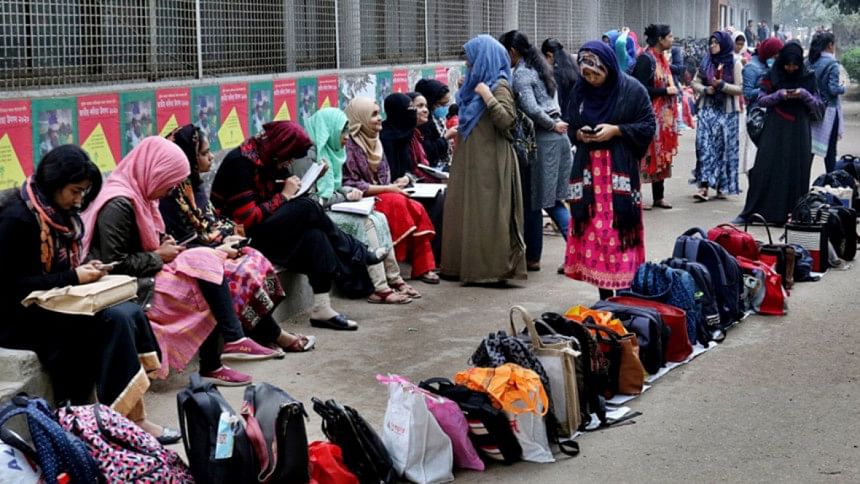Bangladesh needs extensive measures to address its rising youth unemployment

Bangladesh is now one of the world's fastest growing economies, with high rates of GDP growth that continued even during the pandemic. Yet, youth unemployment has been one of the major obstacles to the sustainability of its economic development. Additionally, Covid-19 has considerably affected the global economy and job markets all over the world. According to UNDP, this has been the worst economic recession since the great depression, and we have seen its impacts in Bangladesh as well. Thus, it is going to be a challenge to provide employment opportunities for those who have lost their jobs during the pandemic, as well as for the 2.26 million new entrants into the job market every year, as targeted in the Eighth Five Year Plan.
The reason for high rates of youth unemployment in Bangladesh is two-fold. On one hand, the education system is failing to create a competent and skilled workforce. Instead of career-oriented skills development, the only focus is on good grades. A recent World Bank report identified the skills gap between the supply and demand of industries as the main reason for the high youth unemployment rate in Bangladesh. The existing skills development programmes and institutions have been ineffective in transforming the young population into an efficient workforce. There is a dearth of standard job opportunities relating to the background and subjects that are being taught in the universities.
On the other hand, the drought of employment opportunities is a central reason behind the high youth unemployment rate in Bangladesh. The growth of the job market is meagre compared to the supply of fresh graduates every year. The reason is inadequate investments in both the public and private sectors. Investment into the private sector had been stagnant, at around 22 to 23 percent of GDP for some time. Such sluggish growth in private investment curtails the opportunity of new job creation. Moreover, insufficient diversification in the manufacturing sector also contributes to low employment creation. Bangladesh ranks 168th in the "ease of doing business" index among 190 economies, according to data from 2020, which does not bode well for the flow of foreign direct investment.
According to a World Bank report (2019), one out of every three graduates were unemployed even before the pandemic in Bangladesh. What can be done to alter this? A radical change is needed in the education system for preparing the future workforce in accordance with the job market. Along with academic learning, it is crucial to give more emphasis on cognitive development and obtaining soft skills including adaptability, problem solving, communications, etc.
Technical and Vocational Education and Training (TVET) has been proven to be an effective way of addressing the problem of unemployment in many countries. The existing technical and vocational education and training system requires revitalisation, and a mechanism of adequate monitoring and evaluation system is essential. It is vital that we learn from success cases like South Korea. The subsequent expansion of the skills base has made South Korea's rapid economic development possible. They went through a dynamic skill formation process in the field of education and technical training. The expansion of education and skill development was closely coordinated with responding to changing demands. We can apply the learnings from the East Asian model of skills development for a positive outcome in Bangladesh.
The pace of the growth of investment must also be enhanced to create necessary employment opportunities. Ensuring access to finance, better infrastructure and good governance is central to create an environment that facilitates higher investment. Incentivising and improving private investment can be an avenue to generating more jobs for the young population. To attract more foreign investment, the government needs to concentrate on extensive developments in indicators like the "ease of doing business index" and "efficiency of legal framework index", which would gain the confidence of investors.
In the immediate future, Bangladesh also needs astute measures to adopt with the Fourth Industrial Revolution (the ongoing automation of traditional manufacturing and industrial practices, using modern smart technology). Thus, apart from conventional skills development, the country must prepare its workforce for the transformed job market through human resource development. Introducing data-driven decision-making into industries is indispensable in making them more efficient, so we need to focus on acquiring the technological expertise in this era of information technology and globalisation. On top of that, we need a transformation of the knowledge structure in the labour force, with a clear vision of the job market. Special incentives should be given to encourage technology-based entrepreneurship and innovations.
Furthermore, outsourcing has emerged as a significant source of earnings in recent times. This opportunity can be boosted by promoting online-based freelancing activities and arranging adequate training to accommodate more individuals. It is possible to transform the upcoming industrial revolution into an opportunity of economic expansion by taking appropriate measures. To achieve the Sustainable Development Goals as well as augment the growth process, it is pivotal to prepare the youth segment of the workforce and incorporate them into the development process by creating adequate employment opportunities for them.
Shahriaz Ahmmed is a postgraduate student at the Department of Development Studies, University of Dhaka. Email: [email protected]

 For all latest news, follow The Daily Star's Google News channel.
For all latest news, follow The Daily Star's Google News channel. 



Comments